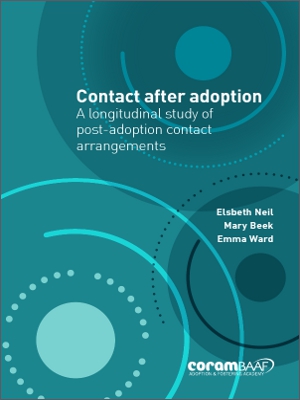
Contact after adoption
£14.95
Decisions about contact between an adopted child and their birth family are an essential part of the child’s placement plan and need to take into account the child’s welfare. It is therefore essential to understand how contact affects adopted children throughout their lives. Research has found that the impact and quality of contact can vary widely. Sometimes it is wanted and valued by children. In other cases it can have an unsettling and disturbing effect. Very little research has included the views of older children and adolescents.
Contact after adoption presents the comprehensive findings of a longitudinal study that followed up a group of adopted children, their adoptive parents and birth relatives, where some form of post-adoption contact was planned. The findings are of particular importance due to the study’s duration – the children, all placed under the age of four, have been followed through preschool, middle childhood and into later adolescence.
The key aims of the study were to explore people’s experiences of contact and its impact on children and adults. A strong body of evidence has been collected about the impact of open adoption on all those involved, and on how children’s experiences of and need for contact change as they grow and develop.
Contact after adoption makes an important contribution to the existing research on contact and offers invaluable practice recommendations.
Who is this book for?
All those involved in making or managing contact with children and families.
What you will find in this book
- Findings from the previous two stages of the Contact after Adoption study
- Design sample and methods of the study at Time 3
- The adopted young people: how were they getting on in adolescence
- The adoptive families: a snapshot of current contact
- The adoptive families: contact pathways over time and evaluations of contact by adoptive parents and young people
- The satisfaction of young people with their contact arrangements
- The adoptive families: adoption communication openness
- Being adopted: well-being and adjustment to the adoption, 16 years on
- The birth relatives: contact pathways and experiences
- Social networking: new challenges for adoptive parents, birth relatives and adopted young people
- Suggestions about contact planning and support made by adopted young people, adoptive parents and birth relatives
Authors
Elsbeth Neil is a Senior Lecturer in Social Work and Director of Research in the School of Social Work at the University of East Anglia. Elsbeth began this study in 1996 and has directed all three stages.
Mary Beek is a registered social worker and a professional adviser for Care for Children, where she facilitates the training of foster carers for children in the Far East. For many years, she has combined practice with research and writing.
Emma Ward, after completing her PhD in Social Work, has worked as a researcher on a wide range of projects at the University of East Anglia.
NOW AVAILABLE IN EBOOK AND HARD COPY
This title is now available in digital-only format for immediate access. Purchases are held in your own personalised online library and accessed via your browser or through the app on your phone or tablet.
Questions about eBooks? Check out our FAQs£14.95
Reviews
This is a fascinating book which presents the detailed findings of this stage of a larger study in an accessible way. The insights which it offers will be of value to all those working in the area of adoption planning and support, as well as those for whom this issue is of personal relevance.
Moira Dunworth, Independent Social Work Practice Teacher
